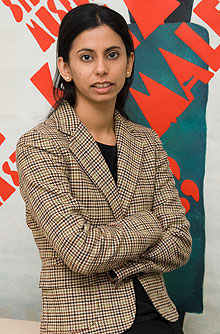  |
| HOME | THIS ISSUE | CALENDAR | GRANTS | BACK ISSUES | < BACK | NEXT > |
Philosopher studies theory and foundations of human rights by Sherry Fisher - January 28, 2008 | ||||
| When Serena Parekh was an undergraduate at McGill University, she hoped to have a career working in Third World countries. “I wanted to go into international development,” says Parekh, now an assistant professor of philosophy at UConn, with a joint appointment at the University’s Human Rights Institute. But after spending a semester in Guyana, she changed her mind.
“It was a good experience,” she says, “but it taught me that I was not cut out for that kind of work.” When she got back, her interests shifted to the theoretical. The subjects of feminist theory and political philosophy became her passion. “They sparked what I was interested in thinking about: questions of justice and questions of equality,” she says. After graduating from McGill, she continued her studies in philosophy at the University of Louvain in Belgium. She went on to earn a Ph.D. in philosophy at Boston College, joining the UConn faculty in 2005. Parekh studies the theory and foundations of human rights. “I do very abstract work on human rights,” she says. She has a special focus on critics of human rights, particularly the European perspective in the 20th century. Much of her work centers on contemporary political philosopher Hannah Arendt, who is the focus of her new book, Hannah Arendt and the Challenge of Modernity: A Phenomenology of Human Rights. Arendt was a German Jew who fled from Germany to France in the 1930s. After Germany invaded France, she was sent to a French internment camp there, but managed to leave and come to the U.S. “She wrote a lot about what it means to be deprived of human rights and what it means to have human rights,” Parekh says. “Arendt was very critical of people who said, ‘We all have natural inborn human rights.’ For her, saying that wasn’t enough for people who are denied their rights. “Theoretically, in the 18th and 19th centuries, human rights were understood as something that existed by virtue of us being human beings,” Parekh says, “so it was less important to put human rights into law, to construct political societies so that people’s rights were protected. But the Holocaust taught us that certain groups of people are, in fact, very vulnerable. Arendt said it is important to belong to a political society that could protect your rights. She is very critical of the discourse of human rights, but with the aim of reforming it and making it better. She didn’t want complacency.” Arendt was concerned about refugees or displaced peoples, Parekh explains. “She was specifically concerned about people who lack citizenship. If you’re outside the city-state, if you’re a refugee, you have no citizenship. No government wants you. You’re basically abandoned. When we talk about human rights as being inalienable, what we really mean is that they’re inalienable if you belong to a political state that cares about them.” The majority of refugees in the world today are in Africa and Asia, says Parekh. Reciprocal treaties between governments dealing with the treatment of refugees are minimally enforced. “For example, women are often sexually assaulted in refugee camps,” she says, “both by other refugees and by the people who are supposed to be in charge of taking care of them. Where do they go? Who do they petition? “Arendt points out the limitations in how we think about human rights,” says Parekh. “If we were really serious about them, we would grant the right to belong to a state as a condition of human rights. Of course, no state in the world would grant that.” Parekh says she loves teaching. “It challenges you to be really clear and to present the material in a way that students can understand and absorb,” she says. She and Anne Hiskes, associate professor of philosophy and director of research ethics and education for stem cell research, developed a new course which they will teach this spring: Bioethics and Human Rights in Cross-Cultural Perspective. “Usually when bioethics and philosophy are taught, you discuss abortion, euthanasia, medical treatment, and so forth,” Parekh says. “We’re covering cutting edge topics – stem cell research, the idea of perfecting the human species, genetic testing, and ethics. We’re also going to examine other cultures, religious traditions, and feminist critics of biotechnology in the West.” |
| ADVANCE HOME UCONN HOME |

